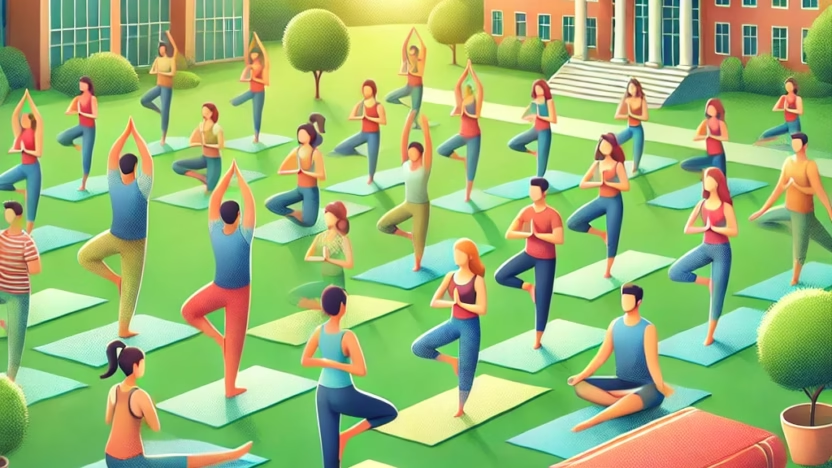College life is a whirlwind of academic challenges, social obligations, and personal growth. With demanding schedules and the pressure to excel, it’s no wonder many students feel stressed and overwhelmed. Yoga, an ancient practice that combines physical postures, breathing techniques, and mindfulness, offers a holistic approach to well-being. For college students, incorporating yoga into daily routines can improve mental health, physical fitness, and academic performance. Here’s how yoga can transform the college experience.
Table of Contents
- 1. Reduces Stress and Anxiety
- 2. Improves Physical Fitness
- 3. Enhances Focus and Concentration
- 4. Promotes Better Sleep
- 5. Boosts Emotional Resilience
- 6. Encourages Healthy Habits
- 7. Accessible and Adaptable
- 8. Enhances Academic Performance
- Getting Started with Yoga
- Conclusion
1. Reduces Stress and Anxiety
Why It Matters
College students often juggle coursework, exams, part-time jobs, and social commitments. This constant pressure can lead to chronic stress and anxiety.
How Yoga Helps
- Mindfulness Practices: Yoga encourages present-moment awareness, reducing worries about the past or future.
- Breathing Exercises: Techniques like pranayama help calm the nervous system and lower cortisol levels.
- Relaxation Poses: Restorative yoga postures, such as Child’s Pose and Savasana, promote relaxation and reduce tension.
Scientific Support
Studies show that regular yoga practice decreases levels of stress hormones and increases endorphins, fostering a sense of calm.
2. Improves Physical Fitness
Why It Matters
Staying physically active is essential for maintaining energy and overall health during college.
How Yoga Helps
- Strength Building: Poses like Plank and Warrior strengthen muscles and improve endurance.
- Flexibility: Regular practice enhances range of motion and prevents stiffness from prolonged sitting.
- Balance and Coordination: Yoga improves proprioception, reducing the risk of injuries.
Scientific Support
Research indicates that yoga improves cardiovascular health, muscle tone, and flexibility, making it an effective full-body workout.
3. Enhances Focus and Concentration
Why It Matters
The ability to concentrate is crucial for studying, retaining information, and performing well in exams.
How Yoga Helps
- Meditation: Incorporating meditation into yoga practice trains the mind to focus on one task at a time.
- Breathing Techniques: Controlled breathing boosts oxygen supply to the brain, enhancing cognitive function.
- Flow States: Moving through sequences like Sun Salutations requires focus, sharpening attention over time.
Scientific Support
Studies suggest that yoga increases gray matter in the brain, improving memory, decision-making, and learning abilities.
4. Promotes Better Sleep
Why It Matters
Sleep is essential for recovery and academic performance, yet many students struggle with insomnia due to irregular schedules and stress.
How Yoga Helps
- Bedtime Routines: Gentle yoga poses, such as Forward Folds and Legs-Up-The-Wall, prepare the body for restful sleep.
- Relaxation Techniques: Yoga reduces overactivity in the nervous system, promoting deeper and more restorative sleep.
Scientific Support
Research shows that yoga improves sleep quality by reducing insomnia symptoms and enhancing overall sleep duration.
5. Boosts Emotional Resilience
Why It Matters
Navigating college life requires adaptability and the ability to manage setbacks effectively.
How Yoga Helps
- Mindfulness Practices: Yoga cultivates a non-judgmental awareness of emotions, helping students respond rather than react to challenges.
- Community Connection: Group yoga classes foster a sense of belonging and support.
- Self-Compassion: Yoga encourages acceptance and self-love, promoting positive mental health.
Scientific Support
Yoga has been shown to reduce symptoms of depression and increase feelings of well-being and emotional stability.
6. Encourages Healthy Habits
Why It Matters
College years are formative for developing lifelong habits that influence health and well-being.
How Yoga Helps
- Mindful Eating: Yoga’s emphasis on mindfulness can lead to healthier food choices and portion control.
- Routine Building: Regular yoga practice establishes discipline and structure in daily life.
- Reduced Substance Use: Yoga practitioners are less likely to engage in harmful behaviors, such as smoking or excessive drinking.
Scientific Support
Practicing yoga is associated with healthier lifestyle choices and improved self-regulation skills.
7. Accessible and Adaptable
Why It Matters
College students often face time and budget constraints, making it important to find flexible wellness solutions.
How Yoga Helps
- Minimal Equipment: A yoga mat and comfortable clothing are all you need.
- Time-Efficient: Short practices, even 10-15 minutes, can yield significant benefits.
- Online Resources: Free or affordable apps and videos make yoga accessible anywhere.
Scientific Support
With countless online platforms and community classes, yoga can fit into any schedule or budget.
8. Enhances Academic Performance
Why It Matters
The ultimate goal of college is academic success, and yoga can directly contribute to better performance.
How Yoga Helps
- Improved Cognitive Function: Enhanced focus, memory, and problem-solving skills lead to better grades.
- Stress Management: Lower stress levels result in more effective studying and test-taking.
- Time Management: The discipline cultivated through yoga extends to academic planning and organization.
Scientific Support
Studies show a correlation between regular yoga practice and improved academic outcomes, particularly in high-stress environments.
Getting Started with Yoga
- Beginner-Friendly Poses: Start with simple postures like Cat-Cow, Downward Dog, and Mountain Pose.
- Apps and Platforms: Explore resources like Yoga with Adriene, Glo, or Daily Yoga for guided practices.
- Join a Class: Check out local studios or campus recreation centers for student-friendly yoga classes.
- Set Goals: Start small with 2-3 sessions per week and gradually increase frequency as it becomes part of your routine.
Conclusion
Yoga offers college students a holistic way to manage stress, enhance physical fitness, and improve mental clarity. By incorporating yoga into your routine, you can build resilience, foster well-being, and thrive academically and personally. Whether you’re a beginner or an experienced practitioner, the benefits of yoga are within reach, making it a valuable tool for navigating the challenges and opportunities of college life.




